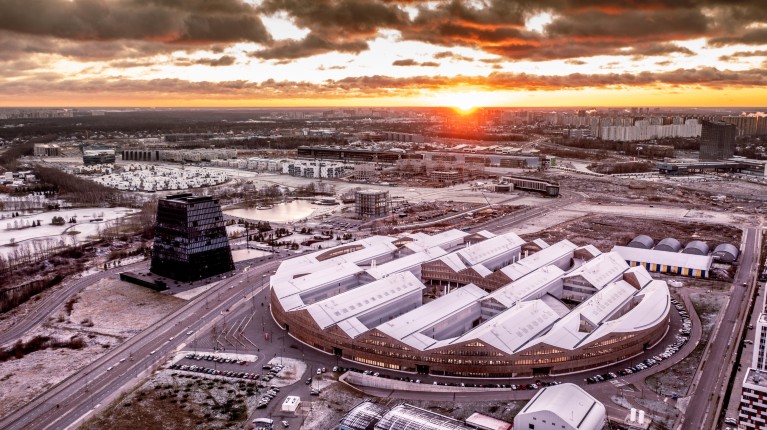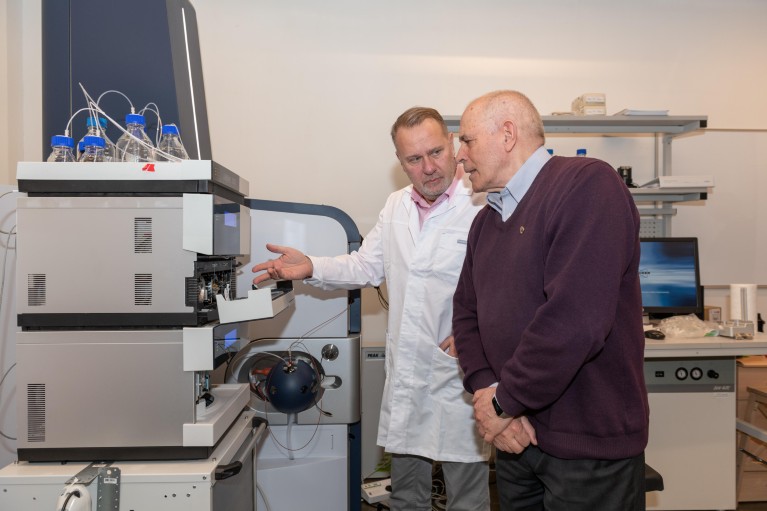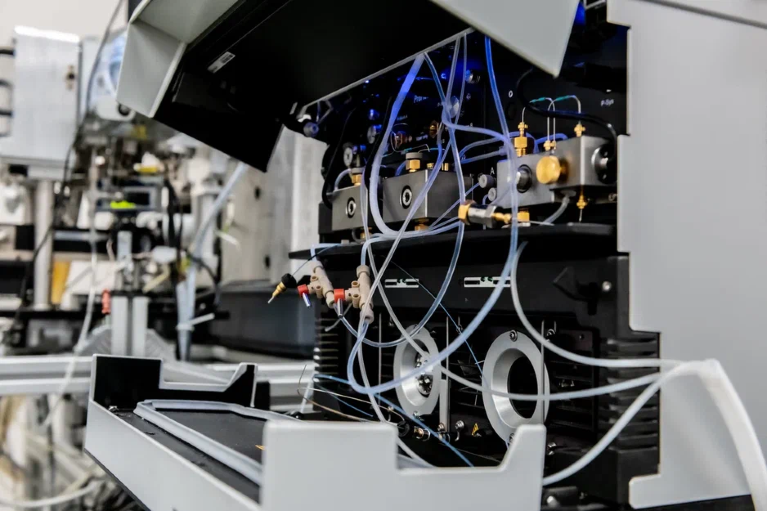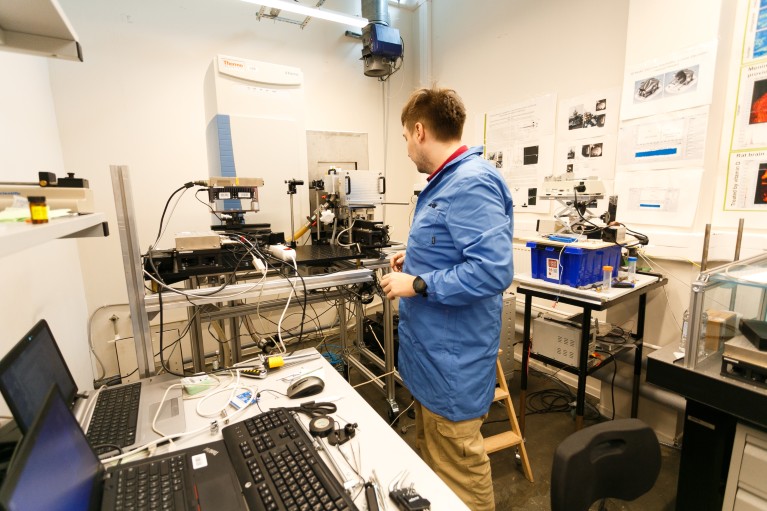
Skoltech Campus, Prix Versailles Campuses Award 2019Credit: Skoltech
Evgeny Nikolaev has his eyes on the heavens. A professor at Skoltech’s Laboratory of Mass Spectrometry, Nikolaev is developing a mass spectrometer for space missions. When installed in spacecraft, this highly sensitive technology will allow scientists to analyse soil and other materials at the Moon’s polar regions, much of which lie in shade and so preserve geological features.
Mass spectrometry can analyse human space travellers as well. Nikolaev has worked with Christoph Borchers, a visiting professor from Canada, and researchers from the Institute of Medico Biological Problems at the Russian Academy of Sciences, to use mass spectrometry to analyse the proteomes of 18 Russian cosmonauts who spent up to 429 days on the International Space Station. The team found a particular set of proteins were involved in the cosmonauts’ structural adaptation to weightlessness.
Professors Borchers and Nikolaev work on a range of scientific problems.Credit: Skoltech
Across the campus, other Skoltech scientists are using different techniques to assess everything from biomarkers and ancient human remains, to the likelihood of survival of COVID-19 patients in hospital. To do so, they can draw on Russian technology and international expertise.
Diverse approaches to medicine
Skoltech’s other specialist area is AI and big data. The university accounts for around 40% of Russia’s AI academic publications. Skoltech’s AI research is diverse, bringing together mathematical, scientific and computational methods used in physics, material science, computational neuroscience, and linguistics. Students have access to the supercomputer Zhores, one of the most powerful in Russia.
Borchers, an expert in cancer and personalized medicine, is working on a multiomics project between Skoltech and his home lab at McGill University. He is developing approaches for faster and more accurate identification and quantification of proteins in biological samples for biomarker identification and clinical diagnostics. The huge quantities of data produced from protein analysis at McGill are then transferred to Skoltech, where the students can use AI to identify the critical proteins.
Pooling their expertise, Nikolaev and Borchers have funding from the Ministry of Science and Higher Education of the Russian Federation to study the detection of the SARS-CoV-2 virus in nasal epithelia in patients with COVID-19. This could be a faster and more accurate way to diagnose infection than PCR tests. It also has potential to help research into the biology and treatment of the infection. Nikolaev and Borchers’s research has also led to a blood test, based on proteins and metabolites. According to the two researchers, this could be used early in a hospital stay to better predict the survival of COVID-19 patients. Such a test could allow doctors to triage patients and tailor their care. “Medicine will be revolutionized by AI,” says Borchers.
The university’s expertise in mass spectrometry promises other benefits to medicine. Skoltech assistant professor, Yury Kostyukevich, uses the technology to explore metabolomics. He aims to find a more accurate way to identify legal and illicit drugs in blood or urine. Existing techniques rely on limited numbers of standard compounds in mass spectrometry databases. This can lead to potential false positives because of similarities between naturally occurring compounds — for example metabolites from food — being mistaken for drug molecules. Kostyukevich is adding chemical properties to the databases, which improves the reliability of detection. He is collaborating with the Russian Ministry of Health and with private companies.

Liquid Chromatography Mass Spectrometry facility.Credit: Skoltech
A new gateway for Russian research
Skoltech was founded in October 2011 as a collaboration between nine Russian institutions and organizations, supported by the Skolkovo Foundation and the Massachusetts Institute of Technology (MIT), in the United States.
The university is modelled on Western institutions. “In traditional Russian institutions, it’s rare for students to have access to world class laboratories, but at Skoltech they can have hands-on experience with the most advanced equipment,” says Kostyukevich. “The professors at Skoltech are top researchers as well as excellent teachers, and students have the opportunity to learn from real-life problems.”
Around a quarter of Skoltech’s students are from outside Russia, and the university also has many international professors. The 2021 student cohort includes more than one thousand MSc and PhD students from 40 countries.
There’s a specific reason why international diversity is so high. “Skoltech’s working language is English, so the university can attract people from all around the world,” says Kostyukevich. “Russia has been open to international researchers since the era of Peter the Great. However, the traditional universities would only admit people who spoke Russian.”
The ratio of students to academics at Skoltech is around seven to one, and the university is a top Russian institution for number of publications. It is one of the top 100 young universities in the Nature Index, and features in the QS World University Rankings for Masters level programmes in Energy Systems, Internet of Things & Wireless Technologies, and Life Sciences.

Techniques like mass spectroscopy are at the heart of Skoltech’s strategy to perform excellent research.Credit: Skoltech
The campus, designed by Swiss architects Herzog & de Meuron, is situated in Moscow and won the Prix Versailles Campuses 2019 prize. “Skoltech is in a beautiful location, and I love the atmosphere. The students are driven and motivated, as well as being open-minded and respecting others’ opinions,” says Borchers. “At Skoltech, students have access to grants that provide them with a good quality of life, and can get involved in collaborations and exchange programmes.”
Skoltech’s research might be forward-looking, but that doesn’t stop it from delving into the distant past. Kostyukevich’s metabolomics work is also helping investigations of archaeological and paleontological artefacts. “Standard approaches just didn’t work on the degraded fabric of mummies or the transformed proteins in fossilized bones,” he explains. “Our combined approach allows us to understand the composition of the materials after thousands or millions of years.”


